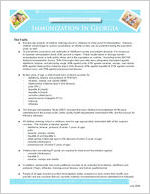The Georgia Department Of Community Health
A SNAPSHOT OF
Immunization In Georgia
The Facts
Georgia law requires all children entering school or childcare to show proof of immunization. However, children should begin to receive vaccinations as infants so they can be protected during the preschool years as well.
To prevent the occurrence and outbreaks of childhood vaccine preventable diseases, it is necessary to maintain immunization levels of 90 percent or higher. Public health clinics in Georgia monitor immunization levels in both public clinics and in the population as a whole. According to the 2007-08 National Immunization Survey, 79% of Georgia's two-year-olds were adequately immunized against diphtheria, tetanus, and whooping cough; 94% against polio; 91% against measles, mumps, and rubella; 89% against Haemophilus influenza type b (Hib disease); 93% against hepatitis B; 91% against varicella (chicken pox); and 78% against pneumococcal disease.
By two years of age, a child should have received vaccines for: diphtheria, tetanus and pertussis (DTP/DTaP) measles, mumps and rubella (MMR) Haemophilus influenza type b (Hib disease) polio (IPV ) hepatitis B (HepB) hepatitis A (HepA) varicella (chickenpox) pneumococcal conjugate (PCV) rotavirus influenza
The Georgia Immunization Study (2007) revealed that most childhood immunizations (81%) were administered in the private sector, while county health departments immunized 9.8%, and the sources for 9% were unknown.
All children entering school or childcare must be age-appropriately immunized with all the required vaccines. This includes protection against: diphtheria, tetanus, pertussis (if under 7 years of age) polio measles, mumps, rubella hepatitis B and hepatitis A Haemophilus influenzae type b (Hib disease) (if under 5 years of age) varicella (chickenpox) pneumococcal (if under 5 years of age)
Children who are entering 6th grade are required to show proof of protection against: varicella (chickenpox) hepatitis b measles, mumps and rubella
In addition, adolescents may need additional vaccines to be protected from tetanus, diphtheria and pertussis (Tdap), influenza, meningococcal disease, and human papillomavirus.
People of all ages should have their immunization status reviewed on each visit to their health care provider and any vaccines that are currently routinely recommended should be administered if indicated.
2 Peachtree Street, Atlanta, Ga 30303 w www.dch.georgia.gov
July 2009
A Snapshot Of Immunization
The Resources
The Georgia Vaccines for Children Program (VFC), which began in October 1994, is coordinated by the Georgia Immunization Program. The Georgia VFC Program provides free vaccines to private and public providers for children birth through 18 years of age who are Medicaid-eligible, American Indian/Alaska Native, uninsured, and underinsured (children whose vaccinations are not covered by insurance) or have PeachCare for Kids coverage. As of December 2008, 244 public health clinics in Georgia and over 3,309 private physicians at 1,012 locations participate.
During 2008, the VFC Program supplied 3,924,814 doses of vaccine to its providers (including public health clinics, private providers, and hospitals).
Public Health's budget for vaccines included $10 million in legislatively appropriated state funds in fiscal year 2009 and another $145 million in federal immunization grant funds for fiscal year 2009.
Fees charged for immunizations vary, depending on ability to pay. For children who qualify for the VFC Program, private providers may charge an administration fee of up to $14.81 per injection. Medicaid and PeachCare reimburse providers for administering vaccinations to Medicaid and PeachCare recipients. However, children cannot be denied VFC vaccine due to the parent's inability to pay the administration fee.
To overcome barriers to vaccination, Georgia's public health departments offer varying clinic hours as staffing levels allow; give vaccinations on a walk-in basis; and distribute educational materials on immunization.
The Georgia Registry of Immunization Transactions and Services (GRITS) is a centralized, secure site of single record storage. GRITS provide an official immunization record for school, child care, and college requirements. This no-cost tool was created in conjunction with the Centers for Disease Control and Prevention. As of July 2004, the registry was expanded to include all ages from birth to death. GRITS is mandated by law, and require that anyone that administers a vaccination in the State of Georgia to any person of any age is mandated to report these instances to the registry.
The benefits of the Georgia Immunization Registry are:
For parents, immunization registries: Consolidate in central location all immunizations a child has received; Provide an accurate, official copy of a child's immunization history for personal, child care, school, or camp entry requirements; Help ensure that a child's immunizations are up to date; Provide reminders when an immunization is due; Provide reminders when an immunization has been missed; Help ensure timely immunization for children whose families move or switch health-care providers; and Prevent unnecessary (duplicative) immunization.
For communities, immunization registries: Help control vaccine-preventable diseases; Help identify high-risk and under-immunized populations; Help prevent disease outbreaks; Provide information on community and state coverage rates; and streamline vaccine management.
Immunizations are needed across the life span and don't end at childhood or adolescence. Adults need to be protected against vaccine preventable diseases too. Depending upon a person's immunization history, age and risk factors, vaccinations may be needed for diseases such as: tetanus, diphtheria, pertussis, measles, mumps, rubella, hepatitis A and B, human papillomavirus virus (HPV), meningococcal disease, influenza, pneumococcal pneumonia, shingles, influenza, and travel vaccines.
A Snapshot Of Immunization
Both influenza and pneumococcal vaccines are covered by Medicare Part B. The best way for a person to ensure that they are adequately protected is to consult with their health care provider and review their immunization record at least once a year.
Immunization Vaccination Campaigns
National Infant Immunization Week (NIIW), April Hepatitis Awareness Month, May National Immunization Awareness Month (NIAM), August National Adult Immunization Week (NAIW), September National Influenza Vaccination Week, December
